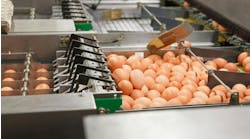Kids in the U.S. got some sour news on Aug. 22 from a major health organization issuing new guidelines to curb children's consumption of sugary foods and beverages. The American Heart Association (AHA) is recommending that children between the ages of two and 18 consume less than six teaspoons of added sugars each day.
Starting in July 2018, food products sold in the U.S. will have to list the amount of added sugars on the Nutrition Facts Panel.
In the first of three new recommendations from the American Heart Association (AHA), a panel of health and nutrition experts suggested that kids consume no more than 6 teaspoons (30 mL) of added sugar a day, according to the organization's statement published in the journal Circulation. It's based on a review of available scientific research on how sugar affects children's health.
That amount of sugar equals about 100 calories, or 25g (0.9 oz.) of sugar. Added sugar is considered to be any sweetener that has calories — such as table sugar, high-fructose corn syrup, honey and molasses — and is used as an ingredient in processing and preparing foods or beverages. Added sugar also includes any sugars a person adds to food or drinks at a meal.
"Our target recommendation is the same for all children between the ages of 2 and 18, to keep it simple for parents and public health advocates," said lead author Dr. Miriam Vos in a heart association news release. "For most children, eating no more than six teaspoons of added sugars a day is a healthy and achievable target," explained Vos, a nutrition scientist and associate professor of pediatrics at Emory University School of Medicine in Atlanta. "There is little room in a child's diet for added sugars, because they need calories from vegetables, fruits, protein sources, whole grains and dairy to grow up healthy," she said.
Added sugar can, however, be used in small amounts to improve the taste of foods that are healthy and rich in nutrition — such as whole-grain cereals, flavored milk or yogurt — to make these foods more appealing for children, she added. But there are loads of added sugar in sugary drinks, cookies, cakes and candies, foods which have little to no nutrition value, Vos cautioned.
The second AHA report recommendation said children younger than 2 years should not consume foods or beverages with added sugars at all. The panels of experts suggested that introducing added sugars in the diets of infants and toddlers may encourage them to develop a preference for sweets from an early age. The third called for children and teens aged 2 to 18 to limit the amount of sugar-sweetened drinks they consume to no more than 8 oz. (240mL) a week.
The report didn't issue guidelines on the use of non-nutritive sweeteners, such as sucralose or aspartame, because it said the panel found few good-quality studies of these sweeteners' benefits or health risks in children.
Children who eat foods loaded with added sugars tend to eat fewer healthy foods, such as fruits, vegetables, whole grains and low-fat dairy products that are good for their heart health," Vos noted. "There has been a lack of clarity and consensus regarding how much added sugar is considered safe for children, so sugars remain a commonly added ingredient in foods and drinks, and overall consumption by children remains high — the typical American child consumes about triple the recommended amount of added sugars," she continued.
"Until then, the best way to avoid added sugars in your child's diet is to serve mostly foods that are high in nutrition, such as fruits, vegetables, whole grains, low-fat dairy products, lean meat, poultry and fish, and to limit foods with little nutritional value," Vos said.
This is the first time the AHA has released its own set of recommendations for kids about added sugars. But previously, Vos explained, the federal government's 2015 Dietary Guidelines for Americans recommended that children get no more than 10 percent of their total calories a day from added sugar.

